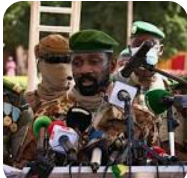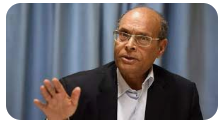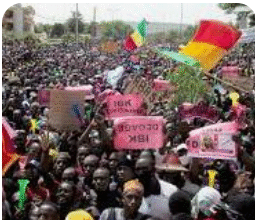By Amadou Keita
BAMAKO, Mali – Mali’s military junta has arrested dozens of soldiers suspected of plotting to overthrow the government, which itself seized power in two previous coups, sources told Agence France-Presse (AFP) on Sunday. The arrests underscore growing internal pressures and dissent within the security forces amid widespread jihadist unrest and the junta’s increasingly authoritarian rule.
“For three days ago, there have been arrests linked to an attempt to destabilise the institutions. There have been at least around 20 arrests,” a Malian security source told AFP. A separate source within the army confirmed an “attempt at destabilisation,” adding, “We have gone ahead with the necessary arrests.”
Among those detained is General Abass Dembele, a respected military officer and former governor of the central Mopti region. “Soldiers came early this morning (Sunday) to arrest General Abass Dembele in Kati,” a town on the outskirts of the capital Bamako, a figure close to the officer stated, adding that the reasons for his arrest were not given.
A member of the National Transition Council, the junta-backed parliament, suggested the scale of the arrests was larger, speaking of “around 50 arrests.” “All are soldiers. Their objective was to overthrow the junta,” the lawmaker claimed.
Since seizing power in back-to-back coups in August 2020 and May 2021, Mali’s military government, led by General Assimi Goïta, has ramped up repression against critics. The country has been grappling with a severe security crisis since 2012, with militants linked to Al-Qaeda and Islamic State groups carrying out violent attacks, alongside rampant criminal and sectarian violence and a dire economic situation.
The junta has notably distanced itself from former colonial ruler France, forging ties with new allies, particularly Russia. Russian mercenaries from the Wagner group and its successor Africa Corps have been assisting the Malian military in its fight against jihadists and other internal adversaries. However, critics, including sociologist Oumar Maiga, argue that this alliance has not fully contained the jihadist threat, and the regular army and its Russian allies are frequently accused of committing atrocities against civilians.
Maiga views the latest arrests as “proof that the officers are struggling to control the situation. There are grumblings within the army’s ranks.” He added that “some soldiers are not happy with the treatment given to the Russian mercenaries at the expense of Malian soldiers.”
The political climate in Mali has become increasingly restrictive under military rule. In July, a bill passed by the military-appointed legislative body granted General Goïta a five-year presidential mandate, renewable “as many times as necessary” and without elections, effectively abandoning an earlier pledge to return to civilian rule by March 2024. The junta has also dissolved political parties and arrested critics, including former Prime Minister Moussa Mara, for expressing solidarity with detained opposition figures.
Mali’s coups have had a ripple effect across the Sahel region, inspiring similar military takeovers in neighboring Niger and Burkina Faso. Despite promises of democratic transition, Mali remains under authoritarian rule, with growing internal dissent and persistent regional insecurity posing significant threats to its future stability.









